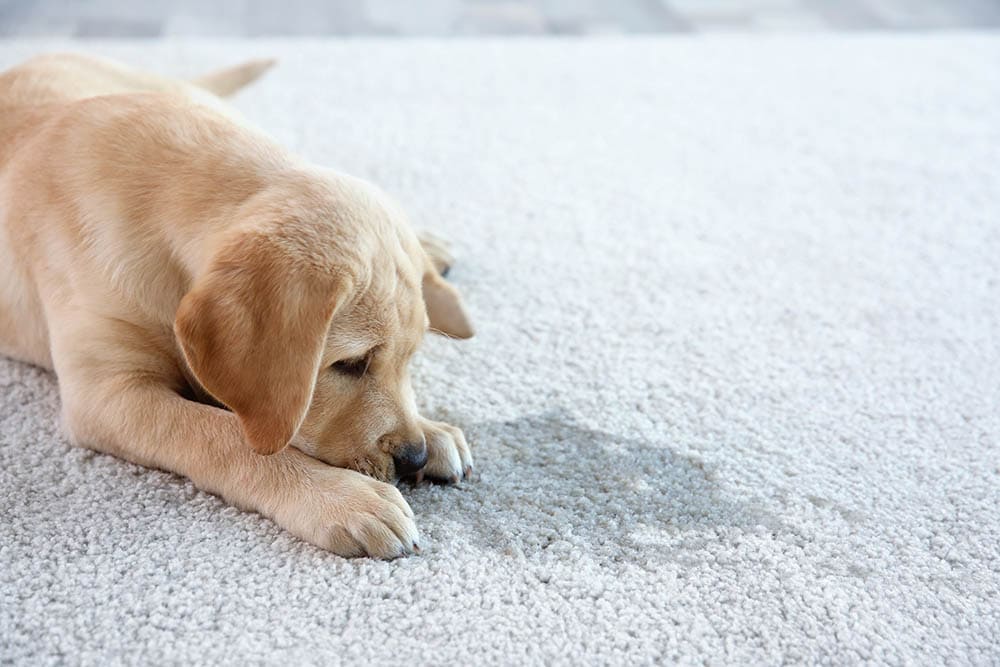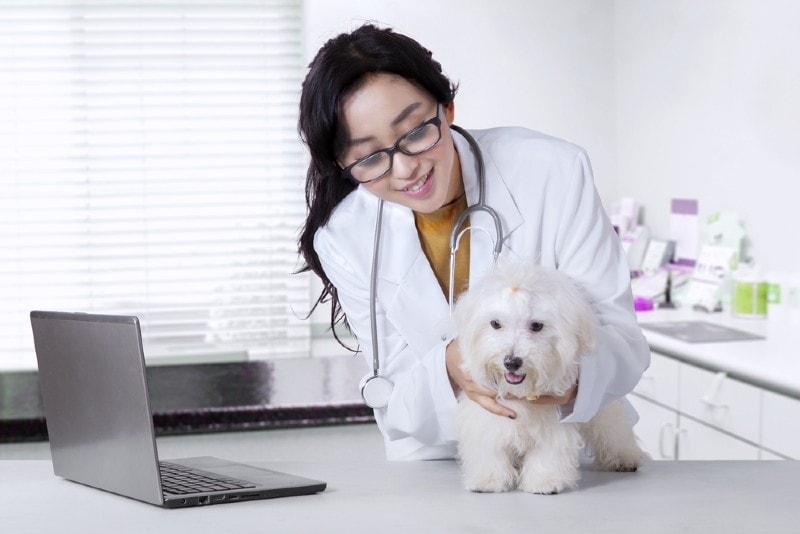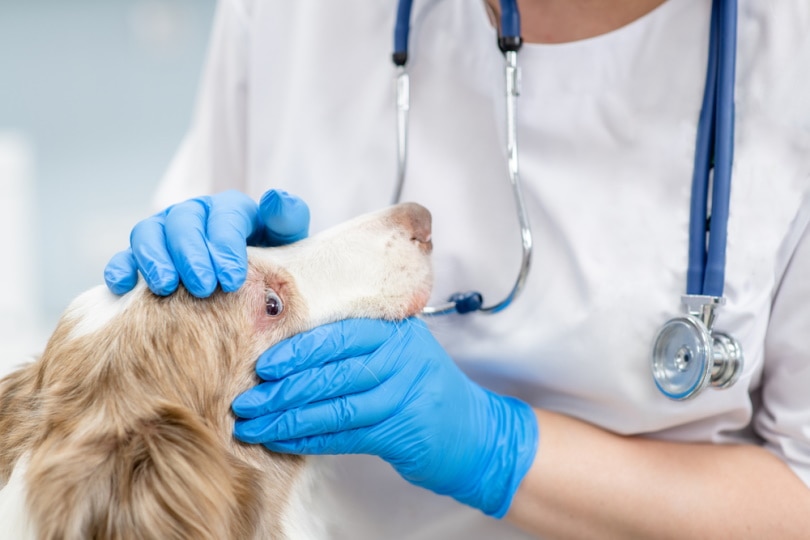Why Does My Dog’s Pee Stink? 5 Vet Reviewed Reasons
Updated on

As dog owners, we often accompany our dogs while they do their business outside. It’s not the best part of pet ownership, but it’s a part of the job. Plus, it gives us a chance to check on our pups and ensure everything is coming out okay.
Usually, everything does come out fine. But then there are days when you notice something unusual, like foul-smelling urine. It hits your nostrils and catches you by surprise. It’s not like dogs smell like roses, but their urine usually doesn’t smell that bad. So, what’s going on?
There are five possible reasons for this, and we’re discussing each of them in this post. Keep reading to find out more.
The 5 Possible Reasons Why Your Dog’s Pee Stinks
1. Urinary Tract Infection (UTI)
The most common reason a dog’s urine stinks is because of a urinary tract infection. Typically, UTIs occur when bacteria travel up the urethra and into the bladder. Once in the bladder, the bacteria reproduce and cause a UTI.
UTIs are common in dogs and cats, but they shouldn’t be left untreated. Typical signs of a UTI include:
- Frequent urination
- Blood in urine
- Pungent urine
- Crying/howling when urinating
- Dripping
- Urinating in the house
- Frequent licking of genitals
Sometimes dogs develop bladder stones before or during their UTI. This can also cause additional health concerns, including smelly urine.
It’s time to go to the vet! A urinary tract infection isn’t something to panic over, but it should be evaluated by a veterinarian immediately. Leaving a UTI untreated can cause the condition to worsen, so make an appointment as soon as possible.
Your vet will want to do a urinalysis and some renal blood work. If your dog does have a UTI, treatment will include antibiotics and possibly prescription food, depending on your dog’s needs.

2. Kidney Disease
The kidneys serve an essential role in the body. They cleanse our blood of toxins and filter those toxins out through our urine. They also regulate levels of essential minerals, like potassium and sodium.
Kidney disease is when the kidneys stop filtering these toxins properly. Many people believe that the kidneys stop producing urine, but this isn’t true. Most dogs with kidney disease produce more urine. The urine is usually more concentrated, producing a foul-smelling aroma.
- Increased water consumption
- Pungent urine
- Frequent urination
- Lack of appetite
- Lethargy
- Vomiting
- Diarrhea
- Depression
- Foul-smelling breath
- Mouth ulcers
You may have noticed that the clinical signs of kidney disease are the same as a UTI. For this reason, the steps to diagnosing kidney disease will be roughly the same. Your vet will want to do a urinalysis and some renal blood work. Additional treatment may include an ultrasound of the kidneys and prescription food.
3. Anal Glands
Anal glands are the two sacs located inside a dog’s rectum. They produce fluid that helps lubricate stool and a scent that allows other dogs to recognize them. Sometimes owners mistake their dog’s anal gland leakage for fishy-smelling urine.
Anal glands should express themselves, which may be why your dog smells bad. But many dogs need their anal glands expressed by a veterinary professional. Usually, dogs scoot their butts across floors when their anal glands cause itchiness. They may also lick their rears often.
If you notice your dog scooting and licking their rear, they probably need their anal glands expressed. A veterinary technician will usually do an anal gland expression on your dog unless you have other concerns that require a doctor’s exam.
4. Medication

Your dog’s urine may be pungent because of medications. Non-steroidal anti-inflammatory drugs (NSAIDs) are pain control substances prescribed for many animals. Blood work is required or strongly encouraged when giving NSAIDs to your pet. The results of NSAIDs can pose serious side effects, especially on the kidneys, so it’s critical to monitor your pet’s health when given these kinds of drugs.
You should have a client information sheet if your pet is on NSAIDs. This will help you stay informed about drug use and side effects.
Call your veterinarian if you believe your dog is experiencing a side effect from the new medicine. Usually, pungent urine isn’t an emergency, but you can always call your preferred emergency animal hospital and explain your dog’s symptoms if you’re concerned.
5. Diabetes
Unfortunately, diabetes is a growing problem with pets in the US. Diabetes is a condition where the body can’t use glucose, the main source of energy in the body. Dogs as young as 4 to 5 years old may start showing pre-diabetic symptoms, but they’re often not diagnosed until they’re between 7 and 10 years old. Taking your dog in for regular checkups is the best way to catch these symptoms early and start treating them as soon as possible.
Diabetic animals are more likely to develop secondary health problems, like UTIs and kidney disease. Even though diabetes may not be the primary cause of your dog’s smelly urine, it can certainly be a factor.
Signs of diabetes in dogs can include:
- Increased water intake
- Increased urination
- Lack of appetite
- Cloudy eyes
- Chronic infections
Your veterinarian needs to test your dog’s blood sugar and run blood work to confirm diabetes. Your veterinarian may also want to test your dog’s urine for sugar. If your dog tests positive for diabetes, a low-carb diet or insulin treatment will be prescribed.
How to Clean Dog Urine From Any Floor
Your dog may be urinating more frequently if they’re experiencing any of the above medical issues. If that’s the case, you’ll want to be ready for any potty accidents in the house. Here are some supplies to keep on hand just in case:
- Potty pads
- Baking soda
- Liquid dish soap
- Vinegar
- Odor remover
- Paper towels
- Mop and bucket
- Dog diapers
To cleanse your floor of stinky dog urine:
- Dab the area with a paper towel to remove excess moisture.
- Mix a cleaning solution of 2 cups of cold water, 1 tablespoon of liquid dish soap, and 1 tablespoon of white vinegar. Make sure you use a liquid dish soap that doesn’t contain bleach so you don’t stain your floor.
- After cleaning the stain, apply baking soda and let it sit for 10 minutes. Vacuum the baking soda afterward if you’re treating carpeting. For an extra cleanse, use an enzymatic spray.
Our favorite enzyme cleaner for eliminating pet smells and stains is our very own Hepper Advanced Bio-Enzyme Pet Stain & Odor Eliminator Spray. It makes clean-up a breeze because it permanently removes even the very worst smells and stains (urine, feces, vomit, you name it!) from basically any surface you can imagine.
- ADVANCED ENZYMATIC CLEANER - Penetrates the most stubborn smells and stains at the deepest molecular...
- FOR ANY MESS, ON ANY SURFACE - This pet odor eliminator cleans your carpets, floors, furniture,...
Conclusion
Now you know some of the main reasons why your dog’s urine smells funky. We understand the frustration of dealing with medical concerns with your pet. It’s a lot to take in and always happens when you least expect it.
Just know that foul-smelling urine isn’t normal and justifies a visit with your veterinarian. The good news is that you caught it instead of leaving it be. All you have to do now is pick up the phone and schedule an appointment for your pooch!
Featured Image Credit: Africa Studio, Shutterstock















